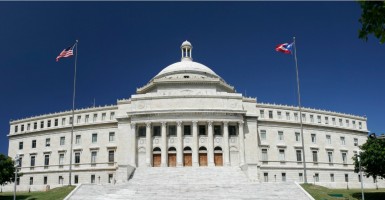Puerto Rico is in the midst of a severe economic and financial crisis and is looking for a way out—or in other words—a change in the rules.
As a U.S. territory, and not a state, Puerto Rico cannot allow its municipalities to file Chapter 9 bankruptcy (a special bankruptcy reserved for municipalities if their state allows it).
Some have called for granting this authority to Puerto Rico.
This would constitute a bailout. The fact that federal tax dollars would not be involved is irrelevant.
There will be losses—Puerto Rico’s debt is too huge for that not to be the case.
But changing the rules of the game would change the distribution of losses to the benefit of some and detriment of others. That is a bailout.
Bankruptcy is supposed to weigh the interests of creditors and debtors alike, but when creditors are faceless investors and debtors are firefighters and teachers with government pensions, it’s easy to see how the outcome can be askew.
In Detroit’s bankruptcy, for example, pension bond insurers received 13 cents on the dollar while pensioners themselves received only small cuts in benefits (some had no reduction in base benefits) and reductions in annual cost-of-living-adjustments.
Investors who purchased Puerto Rican bonds did so knowing that, while they could face losses, they would not be subject to Ch. 9 bankruptcy.
Retroactively allowing Puerto Rico access to Chapter 9 bankruptcy would change the rule of law after individuals and government entities have already entered into agreements based on that law.
Puerto Rico’s governor has said the island cannot pay its debts, so without Ch. 9 bankruptcy, what will happen?
Contrary to what proponents of Ch. 9 bankruptcy would like others to believe, Puerto Rico’s government—namely, its public-private enterprises and municipalities—will not fall apart or enter mass chaos without access to Ch. 9.
Rather, the government’s debtors, such as the Puerto Rico Electric Power Authority (PREPA), will simply follow the rule of law.
Current law specifies that if PREPA outright defaults on its debts (its next interest payment is due Sept. 1), bondholders can ask the Puerto Rican courts to appoint a receiver to take over the company and to try to work out a deal with creditors.
If those attempts fail, the fate of PREPA and its creditors would be left to the courts.
In fact, PREPA is already under the leadership of a chief restructuring officer, Lisa Donahue, and has been engaged in productive negotiations with creditors.
The prospects for reform and a path forward are hopeful, but Chapter 9 bankruptcy could halt these negotiations in their tracks.
So why is there widespread support among Puerto Rico’s government to retroactively employ Chapter 9 bankruptcy?
Arguably, Chapter 9 would provide an easier way for Puerto Rico to write off bad debt without having to enact significant structural reforms that would ensure a path towards long-term solvency.
Preventing Puerto Rico from employing Chapter 9 bankruptcy will not protect creditors from losses, but it will ensure that any losses they incur will be determined by the same laws under which they made their investments.
Along with national defense, rule of law is one of the greatest benefits the U.S. provides to Puerto Rico.
Congress should not take this away by granting Puerto Rico retroactive access to Chapter 9 bankruptcy.






















